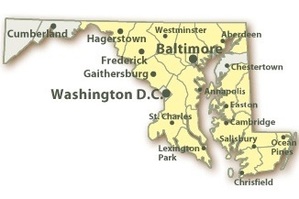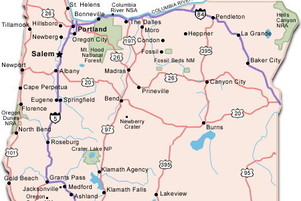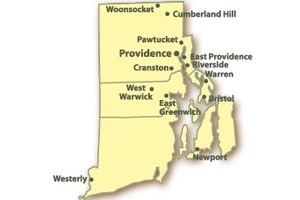






The November Ballots -- A Look At What's At Stake In Each StateFour States Will Let The Voters Decide On Gambling-Related Issues |
|
|
Later this year, residents from a few key states will be deciding on more than just the Presidency. There are a total of four different states who have added gambling-related issues to the ballots, putting millions of dollars in the hands of the voters.
Here is a breakdown of each regulatory issue and the measures that will be voted on come November.
Maryland
 What’s At Stake? A sixth casino, video lottery facility, tax breaks for existing properties and table games.
What’s At Stake? A sixth casino, video lottery facility, tax breaks for existing properties and table games.
Perhaps the most important vote in the gaming world this November will occur in Maryland, where the voters will have the final say in approving gambling expansion for the state’s six casinos.
Due to a special session called by Maryland Governor Martin O’Malley, question 7 of the ballot was added in August and reads as follows:
“Do you favor the expansion of commercial gaming in the State of Maryland for the primary purpose of raising revenue for education to authorize video lottery operation licensees to operate “table games” as defined by law; to increase from 15,000 to 16,500 the maximum number of video lottery terminals that may be operated in the State; and to increase from 5 to 6 the maximum number of video lottery operation licenses that may be awarded in the State and allow a video lottery facility to operate in Prince George’s County?”
If approved, the referendum will expand the type of games allowed at existing casinos, as well as allow an additional casino to be constructed in Prince George’s County. There are also a number of tax breaks that will be given to existing properties to account for the increase in competition.
MGM Resorts, the front runner for the new casino at National Harbor in Prince George’s County, has donated an estimated $2.4 million in support of the measure, while competitor Penn National Gaming, owner of two existing Maryland facilities and a nearby West Virginia property, has been fighting it with a $5.5 million campaign.
Despite the radio and television ads against it, most experts agree that voters will have little hesitation to approve the measure. Maryland residents spend more than $170 million each year in West Virginia casinos and this measure gives them incentive to keep the money in the state. Additionally, the new casinos and table games expansion will create thousands of jobs and generate an estimated $200 million in additional taxes each year. Perhaps more importantly, should the measure be approved, there will be poker available just minutes from Washington D.C.
Prognosis: Strong
Oregon
 What’s At Stake? Privatized casinos and a new property near Portland.
What’s At Stake? Privatized casinos and a new property near Portland.
There are nine measures on Oregon’s ballot, two of which are gambling related. The first measure, no. 82, amends the constitution to authorize the establishment of privately-owned casinos and mandates a percentage of the casino revenue to a dedicated state fund.
Currently, the Oregon constitution prohibits the operation of private casinos, but there are nine tribal casinos located within the state. These Indian casinos provide their tribes with housing and health care funds. Any new private casinos would instead be required to pay 25 percent of their gross revenue each month to the state to aid with the growth of jobs, education and communities.
The ballot will read as follows:
“Amends Constitution: Authorizes establishment of privately-owned casinos; mandates percentage of revenue payable to dedicated state fund.”
The second measure is no. 83, which would utilize the approval of no. 82 to authorize a casino in Multnomah County. If both measures are given a vote of yes, then the owner of the Multnomah Kennel Club will be issued a 15-year renewable gaming license. The casino, prematurely named The Grange, will be located in Wood Village near Portland.
For the most part, those who oppose the measure have strong ties to the state’s Indian tribes and do not want to see their businesses suffer due to an increase in competition. Furthermore, these groups argue that Oregon receives more than enough funding for various programs from the state’s lottery system. However, those in support of the measure point to the increase in state tax revenue, as well as the 2,000 permanent and 1,000 temporary jobs that would be created.
Oregon voters have voted against private casinos in the past, as recently as two years ago. Supporters are hoping that this time, by playing up the proposed property as an entertainment facility rather than a gambling complex, voters will say yes.
Prognosis: Toss Up
Ohio
 What’s At Stake? A fifth casino in the city of Youngstown.
What’s At Stake? A fifth casino in the city of Youngstown.
In 2009, Ohio voters approved the Four Casinos Initiative, allowing for the construction of gambling properties in Cleveland, Toledo, Cincinnati and Columbus. This year, a group led by developers Rick Lertzman and Brad Pressman are pushing for an initiated state statute that will allow for a fifth casino to be built in Youngstown.
Ohio’s first casinos opened in May in Cleveland. Toledo’s property opened a month later.
The measure needed a total of 1,700 signatures before it could be submitted to the Ohio Attorney General’s office, according to state initiative law, but a total of 385,247 would be required to qualify for the ballot in 2012.
If the legislation does not get the required signatures in time, it may be pushed back a year and be submitted for the spring 2013 primary.
Prognosis: Long Shot
Rhode Island
 What’s At Stake? Table games expansion to two state-operated gambling facilities.
What’s At Stake? Table games expansion to two state-operated gambling facilities.
Both question 1 and question 2 of the Rhode Island ballot will concern the expansion of table games to two current gambling facilities, the Twin River Casino in Lincoln and the Newport Grand Casino in Newport.
With Massachusetts gearing up for full Las Vegas-style casinos in the coming years, supporters of both measures are hoping that expanding the current gaming options to include table games will keep more money in the state, rather than bleeding out to neighboring states.
State Representative Michael Marcello, however, has argued that neither measure should be included on the ballot, because the voters had already rejected the legislation in 2010.
One study conducted by the Innovation Group revealed that the Twin River slot parlor would lose roughly $100 million if it were not allowed to offer other games to compete with neighboring casinos in other states. Additionally, a small poll conducted in January indicated that 65 percent of state residents are in favor of allowing table games.
Prognosis: Likely
What Didn’t Make The Cut?
There were a number of gambling measures that were not allowed on the 2012 ballots. Here’s a quick synopsis of the major issues that will not be decided during the election.
Arkansas — A proposal by poker player Nancy Todd to have the exclusive right to operate casinos in the state was rejected by the Arkansas Supreme Court after it was determined that voters were misled by the measure’s language.
Michigan — The Michigan Is Yours gaming amendment would have allowed casinos in seven new locations throughout the state, allocating a 19 percent tax on gross gaming revenue.
Nebraska — The Nebraska Gambling Amendment would have allowed legislators to approve casinos in the state if favored by the voters, however, the bill was voted down by a 5-1 vote in committee.
Alabama — The Alabama Electronic Bingo Amendment would have allowed residents to determine whether bingo could be offered in the state and placed a 25 percent tax on revenue to benefit the public school system and Medicaid.
Arizona — The Arizona Gambling Initiative would have allowed gambling at privately owned casinos and racetracks in an effort to combat the monopoly that Native American tribes currently hold in the state.
Georgia — The Georgia Horse Race Gambling Measure would have established a nine-member racing commission and established parimutuel betting, the tax of which would have gone to college scholarships and trauma care.
Kentucky — The Kentucky Expanded Gambling Amendment would have made gambling legal and allowed five casinos at various racetracks within the state. However, it was widely rejected by various conservative groups.
Maine — The Maine Electronic Beano Question would have allowed two Indian casinos in the state to operate electronic beano, however, the measure failed to collect enough signatures by the deadline.
